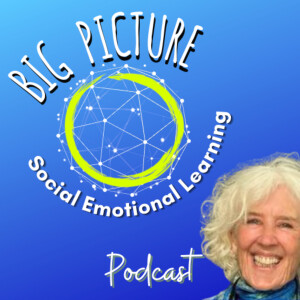
Too few parents and teachers are having actual back-and-forth conversations with young kids… conversation that last for awhile, that have a progression, that build on exchanged ideas…
What a wasted opportunity if ever there was one… in terms of bonding, building trust, and because the brain development that can happen when back-and-forth conversations do happen can make all the difference in children’s overall well being, including, most definitely, the social emotional sides of their life’s well being.
If all we’re ever doing is talking to children, rather than drawing upon their potential to express themselves with language, then it’s almost equal to encouraging them to walk ONLY when they’re holding our hands.
Conversation with children, for real benefits to be achieved, needs to be modeled on conversation that we share with anyone… of any age, as in:
Person number 1, introduces a topic, oftentimes with an open-ended question, then person #1 becomes genuinely, and undivividly (is that a word?) receptive to person #2’s response, who, after expressing themselves will, ideally, will again become receptive to person #1’s next set of thoughts and ideas… and on it can go.
A lot of research has been done on this form of interaction with young children, much of it under the very official sounding descriptor of sustained synchronous interaction - in other words: ongoing unfoldment of conversation in which both people are equally engaged, rather than one person being a mere passive recipient of isolated bits of information or instructions from another person… which, I don’t have to tell you, is what the majority of adult to kid interactions look like.
Let’s just take a moment to sit on that concept… Let’s think about the physiological effect on the brains of the young ones in our care… of the neuronal pathways being built and fortified, with those kinds of mutually respectful, back-and-forth interactions …
Research confirms, without a whisper of a doubt, that young kids who do not start out life with consistent back-and-forth experiences and conversations have intellectual advantages, years later… advantages, even, over kids who’ve been exposed to a lot of formal instruction of information that shows up in high test scores, but whose long-term life skills results are far less impressive. Far less.
Have you heard that before? You probably even know the truth of that fact, just based on your own experiences: that preschool teaching methods emphasizing children’s interactive roles, yield better school achievement in the long term (Golbeck, 2001, Marcon, 2002; Schweinhart & Weikart, 1993).
Another really important fact that research has revealed is beneficial for kids’ social and emotional development is giving kids multiple and consistent opportunities to work together, think together, to connect with, and communicate with and collaborate with others.
Can we continue to grow and grow as prompters, generators, and stimulators of kids’ interactive thinking skills?
There are so many positive and constructive ways we can guide young children’s perspectives and values in these back-and-forth conversations…
One ultra-important way to do this is to consistently share back-and-forth conversations that point out ‘differences.’ To point out that differences are all around us and they are a normal fact of life, to be appreciated, enjoyed, respected rather than something to react to with categorizations, labels, stratifications, fear, judgment, mistrust, a sense of ‘otherness,’ And, again, research absolutely confirms that it’s up to us to have ‘those conversations’ for conveying that basic concept that differences are NORMAL and all around us… starting from the earliest ages. Yes, the earliest ages… even with our littlest ones who are not yet communicating with words… but we KNOW that they’re highly receptive… so let’s do make the most of that fact.
Sesame Workshop surveyed over 6,000 parents and teachers of young children, and foun
view more
More Episodes
012345678910111213141516171819
Create your
podcast in
minutes
- Full-featured podcast site
- Unlimited storage and bandwidth
- Comprehensive podcast stats
- Distribute to Apple Podcasts, Spotify, and more
- Make money with your podcast
It is Free
- Privacy Policy
- Cookie Policy
- Terms of Use
- Consent Preferences
- Copyright © 2015-2024 Podbean.com







